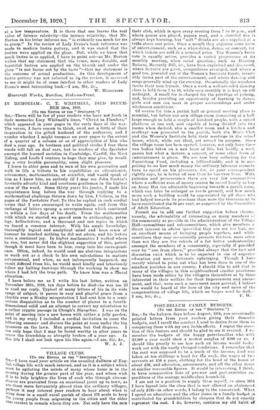VILLAGE CLUBS.
(To THE EDITOR or THE " EPECTATOR29
have read your article on the so-called dullness of Eng- lish village life with much interest, and as it is a subject which must be agitating the minds of many whose home is in the country during the greater part of the year, and whose wish it is to help brighten the lives of such who through circum- stances are prevented from an occasional jaunt up to town, as are those more fortunately placed than the ordinary villager, ,l'e!lhalm it may interest your readers to hear about what is n'hng done in a small rural parish of about 175 souls to keep tl'e Young people from migrating to the cities and the older ones content to remain where they are. Not only have the men their club, which is open every evening from 7 to 10 p.m., and where games are played, papers read, and a cheerful fire is always kept burning, but "soft" drinks are also supplied at a trifle above cost price. Once a month they organize some form of entertainment, such as is whist-thrive, dance, or concert, for which tickets are sold tit a nominal price. The Women's Insti- tute is equally active, provides a varied programme at its monthly meeting, when social questions, such as Housing Reform, Bastardy Bill, So., have been explained and discussed, where lectures are given, competitions arranged, sod where a good tea, provided out of the Women's Institute funds, invari- ably forms part of the entertainment, and where dancing and songs generally wind op the evening. Occasionally the members invite their men friends. Once a week a well-attended dancing class is held from 7 to 10, while once monthly it is kept up till midnight. A small fee is charged for the privilege of joining, and, besides providing an opportunity of learning to dance, girls and men can meet in proper surroundings and under wholesome conditions.
Of course for this a parish hall or general meeting place is essential, but before our own village room (consisting of a hall large enough to hold a couple of hundred people, with a raised platform at one end, and capable of being divided into two rooms when desired, also a smaller room and a kitchen and scullery) was presented to the parish, both the Aletes Club and the Women's Institute held their meetings in the school house, which, while not ideal, yet served its purpose. Sines the village room has been opened, however, not only have these two bodies taken on a new lease of life, but hardly a week passes but what a lecture, a concert, or some other form of entertainment is given. We are now busy collecting for the Furnishing Fund, including a billiard-table, and it is sur- prising to see how much mouey the ordinary labourer seems to have to spend on his pleasures, for, as your correspondent rightly says, he is better off now than ho has ever been. With patience and perseverance there are very few communities where a sufficient sum of money cannot be raised locally to buy an Army-Hut (an admirable beginning towards a parish room, which can later be enlarged as fords permit), and how much more such a building would be appreciated by all those who had helped towards its purchase than were the Government to have contributed the 90 per cent. as suggested by the Committee of Adult Education.
Permit mo to add one further suggestion before closing. namely, the advisability of interesting as many members ui the community as possible in the administration of the Village Hall—committees and sub-committees, which give members a direct interest in affairs (provided they are not too big), are an excellent means of bringing people together, and while sometimes they may occasionally promote friction, more often than not they are the vehicle of a far better untlerstandins amongst the members of a community, especially if presided over by "one from above," provided always that the tact and discretion exist which is to be expected in one of superior education and more fortunate upbringing. Though I have merely wished to point out what has been done in one of the smallest parishes in our county, I should like to add that in many of the villages in this neighbourhood similar provisions have been made either by the villagers themselves or by those interested in their welfare for their improvement and amuse- ment, and that, were such a movement more general, I believe less would he beard of the lure of the city and more of the compensations of village life, which no longer need be dull.—






































 Previous page
Previous page